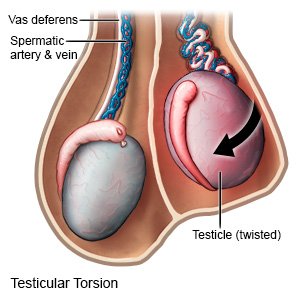Testicular Torsion
Medically reviewed by Drugs.com. Last updated on Sep 23, 2025.
AMBULATORY CARE:
Testicular torsion
is a condition that causes the testicle to be twisted with the spermatic cord. A spermatic cord holds each testicle. The cord contains blood vessels and passageways for sperm. When the spermatic cord is twisted, blood flow to the testicle is reduced or blocked. The lack of blood flow can cause testicle necrosis (tissue death). Testicular torsion needs immediate care to prevent this from happening. This condition usually happens to only one testicle but can happen to both.
 |
Common signs and symptoms of testicular torsion:
- Severe pain and tenderness in your scrotum
- Red and swollen scrotum
- Testicles that appear to hang a bit higher than usual
- Nausea and vomiting
Seek care immediately if:
- You have increased pain, swelling, or redness in your scrotum.
Call your doctor or urologist if:
- You have a fever.
- Your skin is itchy, swollen, or has a rash.
- You have questions or concerns about your condition or care.
Treatment:
You must see a healthcare provider as soon as possible. You may need any of the following:
- Medicine may be given to relieve any pain or swelling.
- Reduction means your provider tries to untwist the spermatic cord by hand. You will need surgery later, even if your provider is able to untwist the cord.
- Surgery may be used to untwist the spermatic cord. Your surgeon will make an incision on your scrotum to reach and untwist the affected testicle. Your surgeon will also check to see if a lack of blood flow damaged the testicle. The testicle may need to be removed. If it does not need to be removed, it will be attached to the wall of your scrotum to prevent another torsion. The other testicle will also be attached to prevent torsion.
Follow up with your doctor or urologist as directed:
Write down your questions so you remember to ask them during your visits.
© Copyright Merative 2025 Information is for End User's use only and may not be sold, redistributed or otherwise used for commercial purposes.
The above information is an educational aid only. It is not intended as medical advice for individual conditions or treatments. Talk to your doctor, nurse or pharmacist before following any medical regimen to see if it is safe and effective for you.
Further information
Always consult your healthcare provider to ensure the information displayed on this page applies to your personal circumstances.
